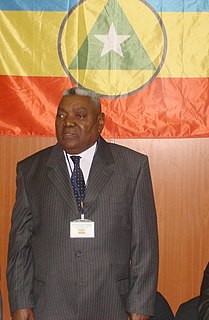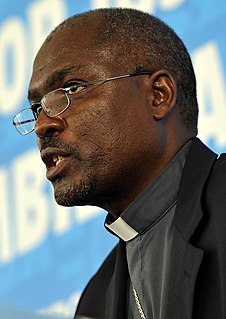Related Research Articles

Angola, officially the Republic of Angola, is a country located on the west coast of Southern Africa. It is the second-largest lusophone (Portuguese-speaking) country in both total area and population, and it is the seventh-largest country in Africa, bordered by Namibia to the south, the Democratic Republic of the Congo to the north, Zambia to the east, and the Atlantic Ocean to the west. Angola has an exclave province, the province of Cabinda that borders the Republic of the Congo and the Democratic Republic of the Congo. The capital and largest city is Luanda.

The Catholic Church in Angola is part of the worldwide Catholic Church, under the spiritual leadership of the Pope in Rome. Approximately 56.4% of the population profess the Catholic faith, due largely to Angola's status as a former Portuguese colony.

The 2010 Africa Cup of Nations, also known as the Orange Africa Cup of Nations for sponsorship reasons, was the 27th Africa Cup of Nations, the biennial football championship of Africa (CAF). It was held in Angola, where it began on 10 January 2010 and concluded on 31 January.

Alexandre do Nascimento is an Angolan Cardinal of the Catholic Church. He served as Archbishop of Luanda from 1986 to 2001 and was made a cardinal in 1983.
The Archdiocese of Luanda is the oldest Roman Catholic (arch)bishopric in Angola.
The Archdiocese of Huambo is a Latin Metropolitan archdiocese of the Roman Catholic Church in western Angola.
Damião António Franklin was an Angolan prelate of the Roman Catholic Church. He was the fifth Archbishop of Luanda.
The Roman Catholic Diocese of Cabinda is a diocese located in the city of Cabinda in the ecclesiastical province of Luanda in Angola.
The Roman Catholic Archdiocese of Saurimo is an archdiocese located in the city of Saurimo in Angola. Prior to its elevation to an archdiocese in 2011 it belonged to the Ecclesiastical province of Luanda. It has oversight of two suffragan dioceses, which until then had been part of other Angolan Provinces, are the Diocese of Lwena and the Diocese of Dundo.
The Roman Catholic Archdiocese of Malanje is an archdiocese located in Malanje, Angola. Until its elevation to an archdiocese in 2011, it belonged to the Ecclesiastical province of Luanda, like the two dioceses over which it has now oversight: the Diocese of Uíje and the Diocese of Ndalatando.

Henrique N'zita Tiago was President of the Armed Forces of Cabinda, a rebel group that fights for the independence of Cabinda from Angola. He died in Paris on 3 June 2016. It was reported that Tiago was 88 years old when he died, and that he was buried in France – as Cabinda was not independent at the time of his death.

Zacarias Kamwenho is an Angolan emeritus Archbishop and peace activist. He had an important role in the peace process that led to the end of the Angolan Civil War in 2002.

Gabriel Mbilingi C.S.Sp., is the current Angolan Archbishop of Lubango. Since 20 November 2009 he is the president of the Episcopal Conference of Angola and São Tomé and Principe, short named CEAST.

Giovanni Angelo Becciu is an Italian prelate of the Roman Catholic Church. Pope Francis made him a cardinal on 28 June 2018. On 24 September 2020, he resigned the rights associated with the cardinalate.
Prostitution in Angola is illegal and prevalent since the 1990s. Prostitution increased further at the end of the civil war in 2001. Prohibition is not consistently enforced. Many women engage in prostitution due to poverty. It was estimated in 2013 that there were about 33,00 sex workers in the country. Many Namibian women enter the country illegally, often via the border municipality of Curoca, and travel to towns such as Ondjiva, Lubango and Luanda to work as prostitutes.
The Episcopal Conference of Angola and São Tomé is the Catholic Bishops' Conference of Angola and São Tomé and Principe. It has its headquarters in Luanda. The 21st since the November 2009 Acting Chairman is Gabriel Mbilingi, Archbishop of Lubango. Vice President of CEAST, the Bishop of Cabinda, Filomeno do Nascimento Vieira Dias. In the pastoral letters of the CEAST calls again and again for more social justice.
The 2006 Taça de Angola was the 25th edition of the Taça de Angola, the second most important and the top knock-out football club competition following the Girabola.

Eugenio Dal Corso is an Italian prelate of the Catholic Church who led two dioceses in Angola, as Coadjutor and Bishop of Saurimo from 1996 to 2008 and as Bishop of Benguela from 2008 to 2018. He is a professed member of the Poor Servants of Divine Providence and worked as a missionary in Argentina and Angola from 1976 to 1996.
Filomeno do Nascimento Vieira Dias is an Angolan prelate of the Catholic Church who has been Archbishop of Luanda since 2015; he was an auxiliary bishop there from 2003 to 2005. He was Bishop of Cabinda from 2005 to 2014, where his lack of identification with the province and its separatist movement initially made his appointment controversial and he was only installed after sixteen months.
References
- "bishop/bfernma". Catholic-Hierarchy.org . David M. Cheney.
- „Angola: Morreu o primeiro bispo de Cabinda“ (Portuguese)